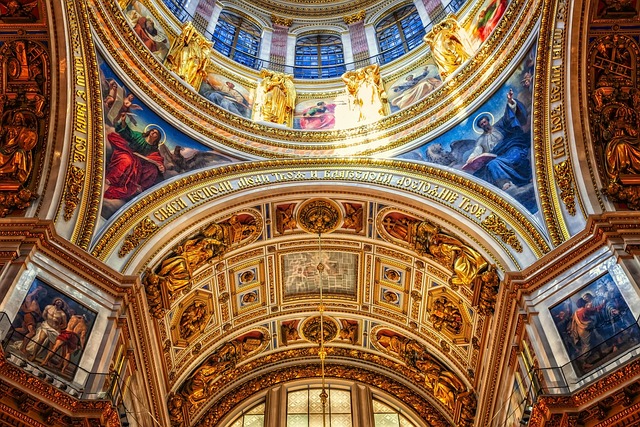Orthodox Christians worship the Holy Trinity, which consists of God the Father, God the Son (Jesus Christ), and God the Holy Spirit. They believe in the divinity of Jesus Christ and worship Him as the Son of God and the Savior of humanity. The Orthodox Church places a strong emphasis on liturgical worship, sacraments, and the veneration of icons.
Table of Contents
The Importance of Icons in Orthodox Worship
Icons play a significant role in Orthodox worship, serving as a visual representation of the divine. These sacred images are not mere decorations but are considered windows into the spiritual realm. They are revered and venerated, not worshipped, as some may mistakenly believe.
In Orthodox Christianity, icons are seen as a means of connecting with the divine and deepening one’s spiritual journey. They are believed to be a tangible link between the earthly and heavenly realms, allowing believers to experience the presence of God in a tangible way. Icons are not idols, but rather tools that aid in prayer and meditation.
The use of icons in worship can be traced back to the early days of Christianity. In the early church, icons were used to teach and inspire believers, especially those who were illiterate. These sacred images depicted scenes from the life of Christ, the Virgin Mary, and the saints, serving as visual aids for understanding and contemplating the mysteries of the faith.
Orthodox Christians believe that icons are not just representations of the divine, but that they also contain the presence of the person or event they depict. When an icon is venerated, it is not the physical object that is worshipped, but the spiritual reality it represents. The faithful believe that through the veneration of icons, they are able to connect with the saints and seek their intercession.
The veneration of icons involves various rituals and gestures. When approaching an icon, believers often make the sign of the cross and bow in reverence. They may also kiss the icon as a sign of respect and love. These acts of veneration are not directed towards the material object itself, but towards the spiritual reality it represents.
Icons are typically painted using specific techniques and styles that have been passed down through generations. The process of creating an icon is considered a sacred act, with the artist often engaging in prayer and fasting before beginning their work. The use of specific colors, symbols, and gestures in iconography carries deep spiritual significance and is intended to convey theological truths.
The presence of icons in Orthodox churches is not limited to the walls. Iconostases, ornate screens adorned with icons, separate the sanctuary from the nave. These screens serve as a visual reminder of the heavenly realm and the presence of the saints. They also symbolize the barrier that was torn apart at the crucifixion, granting believers access to the divine.
Icons are not only found in churches but are also present in Orthodox homes. Many Orthodox Christians have a designated prayer corner or icon corner in their homes, where they display icons and other religious items. This space serves as a focal point for prayer and reflection, allowing believers to create a sacred atmosphere in their daily lives.
In conclusion, icons hold great importance in Orthodox worship. They are not objects of worship but rather tools that aid in connecting with the divine. Icons serve as visual representations of the spiritual realm, allowing believers to deepen their faith and seek the intercession of the saints. Whether in churches or homes, icons play a vital role in Orthodox spirituality, reminding believers of the presence of God and the communion of saints.
Understanding the Role of Saints in Orthodox Worship

When it comes to understanding the role of saints in Orthodox worship, it’s important to first grasp the concept of worship itself. Orthodox Christians believe that worship is not just a personal act, but a communal one. It is a way for believers to come together and express their love and devotion to God. And in this communal act of worship, saints play a significant role.
In the Orthodox tradition, saints are seen as holy men and women who have lived exemplary lives and have been recognized by the Church for their faith and devotion. They are considered to be close to God and are believed to have the ability to intercede on behalf of believers. This belief in the intercession of saints is a central aspect of Orthodox worship.
When Orthodox Christians gather for worship, they often have icons of saints present. These icons serve as reminders of the saints’ presence and their ability to intercede for the faithful. The icons are not worshipped themselves, but rather venerated as a means of connecting with the saints and seeking their prayers.
Orthodox Christians also pray to the saints, asking for their intercession in various aspects of life. This practice is not meant to replace direct communication with God, but rather to enhance it. Just as one might ask a friend or family member to pray for them, Orthodox Christians ask the saints to pray for them as well.
The saints are seen as spiritual guides and mentors, offering inspiration and encouragement to believers. They are seen as examples of how to live a holy life and are often invoked for guidance and protection. Orthodox Christians believe that the saints are not distant figures, but rather active participants in the life of the Church.
In addition to their role in worship, saints are also commemorated on specific feast days throughout the year. These feast days are an opportunity for believers to honor and remember the saints, and to seek their intercession. The saints are seen as part of the larger family of believers, and their feast days are celebrated with joy and gratitude.
It’s important to note that the veneration of saints in Orthodox worship is not meant to detract from the worship of God. Rather, it is seen as a way to draw closer to God and to seek His grace and mercy. The saints are seen as mediators, helping to bridge the gap between humanity and divinity.
In conclusion, the role of saints in Orthodox worship is one of intercession and inspiration. They are seen as holy men and women who have lived exemplary lives and are recognized by the Church for their faith and devotion. Orthodox Christians venerate the saints through icons and ask for their prayers, seeing them as spiritual guides and mentors. The saints are not worshipped themselves, but rather seen as a means of connecting with God and seeking His grace. Their feast days are celebrated with joy and gratitude, as believers honor and remember their lives. Ultimately, the role of saints in Orthodox worship is one that enhances the worship of God and deepens the believer’s relationship with Him.
Exploring the Orthodox Perspective on the Holy Trinity
When it comes to understanding the Orthodox perspective on the Holy Trinity, it is important to first grasp the concept of worship. For Orthodox Christians, worship is not just a religious duty or a set of rituals to be performed. It is a deeply personal and transformative experience that allows them to connect with God in a profound way.
In the Orthodox tradition, the Holy Trinity is at the very core of their faith. The belief in one God who exists in three persons – the Father, the Son, and the Holy Spirit – is central to their understanding of God’s nature. This belief is rooted in the teachings of the early Church fathers and has been passed down through generations.
Orthodox Christians believe that the Father is the source of all things, the creator of the universe. He is the one who sent his Son, Jesus Christ, into the world to save humanity from sin and death. The Son, who is fully God and fully human, took on human flesh and lived among us. He taught us about God’s love and mercy and ultimately sacrificed himself on the cross for our salvation.
The Holy Spirit, the third person of the Trinity, is the one who empowers and guides believers in their journey of faith. It is through the Holy Spirit that Orthodox Christians experience the presence of God in their lives. The Spirit is seen as the one who sanctifies and transforms individuals, making them more like Christ.
In Orthodox worship, the Holy Trinity is honored and glorified. The liturgy, or the public worship service, is the central act of worship for Orthodox Christians. It is a rich and vibrant experience that engages all the senses. The liturgy is filled with prayers, hymns, incense, and icons – all of which help to create an atmosphere of reverence and awe.
During the liturgy, the Orthodox faithful participate in the Eucharist, also known as the Divine Liturgy. This is a sacrament in which bread and wine are consecrated and believed to become the body and blood of Christ. Through the Eucharist, Orthodox Christians believe they are communing with God and receiving his grace.
In Orthodox worship, there is a strong emphasis on the communal aspect of faith. The faithful gather together as a community to worship and pray. This sense of community is seen as an essential part of the Christian life, as believers support and encourage one another in their spiritual journey.
Orthodox Christians also have a deep reverence for the saints. These are individuals who have lived holy lives and are believed to be in the presence of God. The saints are seen as intercessors, praying on behalf of the faithful and offering guidance and support. Icons of the saints are often present in Orthodox churches and homes, serving as reminders of their presence and inspiration.
In conclusion, the Orthodox perspective on the Holy Trinity is one of deep reverence and awe. Orthodox Christians believe in one God who exists in three persons – the Father, the Son, and the Holy Spirit. Through their worship, they seek to connect with God and experience his presence in a transformative way. The liturgy, the Eucharist, and the sense of community all play important roles in Orthodox worship. And the saints are honored and revered as intercessors and sources of inspiration. Understanding the Orthodox perspective on the Holy Trinity can provide valuable insights into their rich and vibrant faith tradition.
Unveiling the Mystery of the Divine Liturgy in Orthodox Worship
Have you ever wondered who Orthodox Christians worship? The answer may surprise you. In Orthodox worship, the focus is not on a specific individual or group of individuals, but rather on the mystery of the Divine Liturgy. This ancient and sacred ritual is at the heart of Orthodox worship and is believed to bring the worshipper into direct communion with God.
The Divine Liturgy is a complex and beautiful service that is steeped in tradition. It is a carefully choreographed dance of prayers, hymns, and rituals that have been passed down through the centuries. The service is led by a priest, who acts as a mediator between the congregation and God. However, it is important to note that the priest is not the object of worship. Instead, he is seen as a vessel through which the worshipper can connect with the divine.
During the Divine Liturgy, the congregation participates in a variety of rituals and prayers. These rituals are designed to help the worshipper enter into a state of deep reverence and awe. One of the most important rituals is the Eucharist, or Holy Communion. This is the moment when the bread and wine are transformed into the body and blood of Christ. Orthodox Christians believe that by partaking in this sacrament, they are receiving the very essence of God into their own bodies.
In addition to the Eucharist, the Divine Liturgy also includes a number of prayers and hymns. These prayers are carefully chosen to reflect the themes of the service and to help guide the worshipper in their journey towards God. The hymns, on the other hand, are meant to be sung by the congregation as a way of expressing their devotion and praise. Together, these prayers and hymns create a powerful and transformative worship experience.
It is important to note that Orthodox worship is not limited to the Divine Liturgy. In fact, Orthodox Christians engage in a variety of other spiritual practices as well. These practices, such as fasting, prayer, and almsgiving, are seen as a way of deepening one’s relationship with God and preparing oneself for worship. They are not seen as a means of earning salvation, but rather as a way of opening oneself up to the grace of God.
So, who do Orthodox Christians worship? The answer is simple: God. Orthodox worship is not about worshipping a specific individual or group of individuals, but rather about entering into communion with the divine. The focus is on the mystery of the Divine Liturgy and the transformative power of the sacraments. Through careful rituals, prayers, and hymns, Orthodox Christians seek to connect with God and experience His presence in their lives.
In conclusion, Orthodox worship is a deeply spiritual and transformative experience. It is not about worshipping a specific individual, but rather about entering into communion with the divine. The focus is on the mystery of the Divine Liturgy and the transformative power of the sacraments. Through careful rituals, prayers, and hymns, Orthodox Christians seek to connect with God and experience His presence in their lives. So, the next time you find yourself wondering who Orthodox Christians worship, remember that the answer is simple: God.
Conclusion
Orthodox Christians worship God, specifically the Holy Trinity, which consists of God the Father, God the Son (Jesus Christ), and God the Holy Spirit. They also venerate and honor the saints and angels as part of their worship practices.
For licensing reasons, we must provide the following notice: This content was created in part with the help of an AI.


